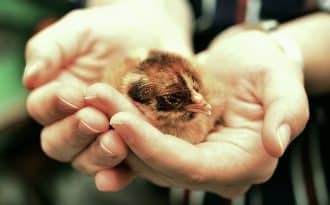Halacha and Jewish Ethics: Rabbi David Rosen

How do you see Bal Taschit (wasteful destruction) linking to the consumption of animal products?
The Jewish concept of Bal Taschit is of enormous importance with regards to the imperative to change our lifestyle, our diet, and to save our planet and of our environment responsibility. The principle of Bal Taschit, based upon the teaching in Deuteronomy, in the book of Devarim, that one mustn’t destroy fruit trees, is extended within Judaism to any kind of wastage. Every Jewishly observant child is raised to understand that food is something precious and that you mustn’t waste it. And not just food, all G-d’s gifts, material gifts, should be valued and should not be wasted. So wastage is in simple terms a sin, according to Judaism, it is a desecration of the material blessing that G-d has provided for us.

The livestock industry and the production of beef, and of dairy products and of eggs, causes not only enormous pain and distress in our modern world, far greater than any cruelty ever before, but it also involves an enormous amount of wastage of natural resources. For just a small fraction of the amount of water and of land that is used in the production of animal products, we could feed the world. And as a result, not only are we unnecessarily wasting, we are failing in our human responsibilities to sustain society, to feed your bread to the hungry, to share those blessings with others. So the principle of Bal Taschit – which is precisely a manifestation of human sensitivity, awareness of the gifts that we are receiving that nothing is ours by rights, that we are essentially stewards in this world and that we have a responsibility, a sacred custodianship of our world – is one of the most important imperatives for our world today – to save our planet and to live in a responsible and morally noble manner.
Does the killing of male chicks in egg production violate Bal Taschit?

Egg production in our commercial world today is done in the most cruel manner, with male chicks being killed immediately either through grinders or through being suffocated. And this is not only a question of the issue of Bal Taschit, of the question of wasting a natural gift, but it is above all a question of the prohibition of Tzaar Baalei Chayim, causing cruelty to animals. It is true that Judaism does allow animal consumption and probably there were times and places where, without that, people could not get necessary nutrients to be able to live a healthy life. Today you can get all your nutrients without needing to be party to such cruelty that is so barbaric in our times. So today, unless you are living in absolutely idyllic farmyard conditions, the consumption of eggs from the commercial industry that are available to the vast majority of people seems to be a direct contradiction with Jewish teaching.
You just mentioned Tsaar Baalei Chayim in the egg industry. Can you speak about it in relation to the meat and dairy industries?
The livestock industry today involves more cruelty than ever before. The situations, paradoxically, are far more barbaric today than they were in ancient times in order to meet the demands for human indulgence at the expense of sentient living beings who are treated in the most barbaric manner. This applies to animals, cows, other animals that are slaughtered for human consumption. It applies to the dairy industry in the way that cows are treated and the way that they are maintained and the conditions under which they are kept. It applies to chickens and the conditions under which they are kept. And all these involve desecrations of Jewish teachings with regards to the prohibition of causing undue suffering to animals – Tsaar Baalei Chayim. It is virtually impossible today to maintain Jewish teaching and consume the products of animal products that are on the market because these involve such desecration of the prohibition against causing cruelty to animals.

So let’s talk about organic eggs…
Organic eggs are often portrayed as if they are cruelty free and therefore completely consistent with ethical sensibilities and therefore with Jewish ethical teaching. But the fact is that the vast majority of organic eggs on the market are still the product of enormous cruelty in terms of the production as a whole. And therefore organic does not necessarily mean cruelty free. In fact often “cruelty free” does not really mean cruelty free because it could mean that the conditions are a little bit better than some of the confined spaces where the chicks are de-beaked in a brutal way.
Additional Interview Links:
